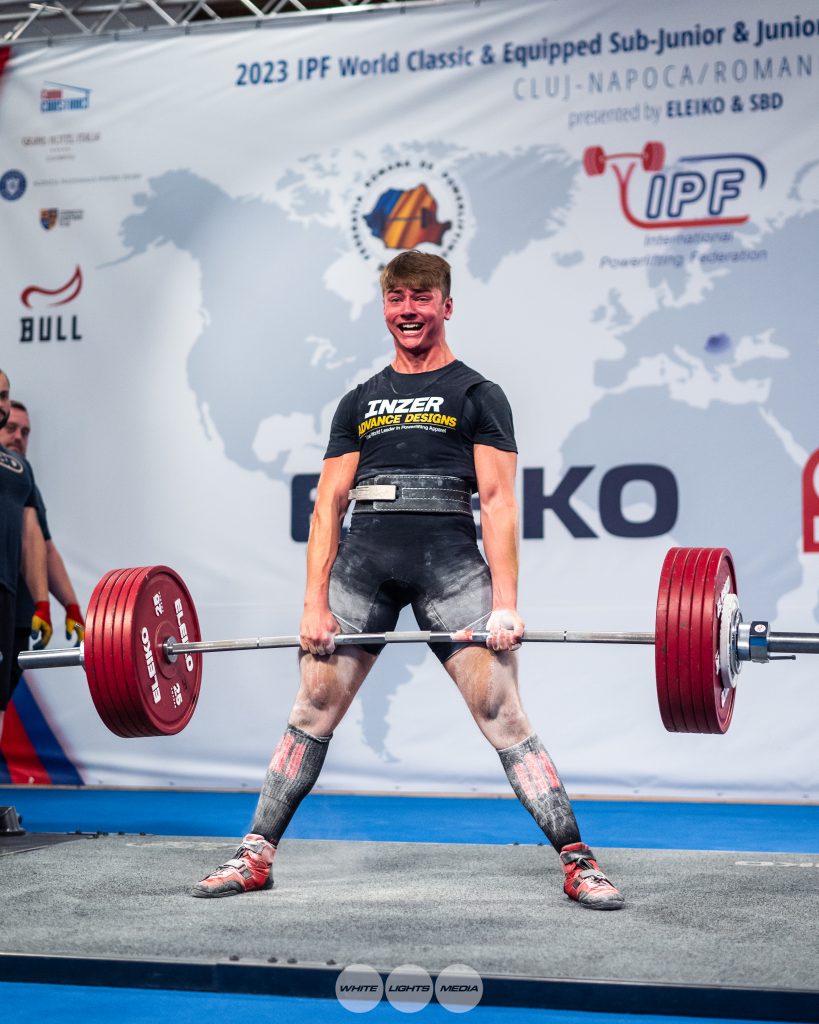Joseph Tyler, a Binghamton University freshman majoring in biology, recently competed at the 2023 International Powerlifting Federation (IPF) World Junior and Sub-Junior Classic Championships in Cluj-Napoca, Romania, powering Team USA to a gold medal. The meet brought together 653 athletes from 39 different countries.
Winning a gold medal in the deadlift and a silver medal for total lift, Tyler lifted a total of 1,488.1 pounds. Specific event performances included a 534.6-pound squat, 319.6-pound bench press and a 633.8-pound deadlift — the highest total at the meet and a personal record.
In powerlifting, there are three separate events that an athlete must compete in — the squat, bench press and deadlift. Competitors must also follow commands from judges for a lift to count. For the squat event, the referee will say when to squat and rack. When bench pressing, the official will tell the competitor when to start, press and rack. For the deadlift, the referee will give a down command to place the barbell on the platform after the competitor’s knees and shoulders are locked out.
Each participant must receive a total of two out of three white lights on each lift for that specific lift to count. Failure to adhere to the judge’s commands will result in a failed lift.
Tyler described how he first discovered powerlifting and his competitive journey in the sport that allowed him to qualify for the IPF World Junior and Sub-Junior Classic Championships.
“My older brother played a big role in [getting me into the sport, and] he kind of drew me to it,” Tyler said. “[USA Powerlifting] had a falling out with [the] IPF, and there was a new organization formed that represented Team USA at [the IPF world championship], called Powerlifting America.”
Tyler also discussed his mental and physical preparation for the IPF World Junior and Sub-Junior Classic Championships.
“The [preparation] was pretty intensive,” Tyler said. “It consisted of a no-sodium diet and a water loading phase, so that you can actually sweat out and expel the excess water to reduce your weight for the weigh-in.”
He said that he self-managed his macronutrient intake and consumed no carbohydrates, due to their high water retention. To create a training regimen, he said that he had a programmer who helped him determine the total sets and volume per session and worked with USA national coaches. He expressed the importance of their coaching and experience on his performance.
As a student, he described how he balances the rigors of training with his academic course load.
“It’s slowly adding on more to your schedule and making sure that you have time for relaxation and you have time to recharge for the next day,” Tyler said. “Being organized helps as well, and making sure to do the work that you [plan] to do at that time, that day and not procrastinate.”
Tyler expressed interest in bridging the gap between powerlifting and health care to help others improve their lives. Tyler advised aspiring powerlifters by alluding to the importance of prioritizing form over weight and being consistent and deliberate, because avoiding injury is paramount to making progress.
When reflecting on the stakes of the competition, he described his last lift of the event.
“I needed that deadlift to get second place in the competition, so it was all or nothing,” Tyler said.



